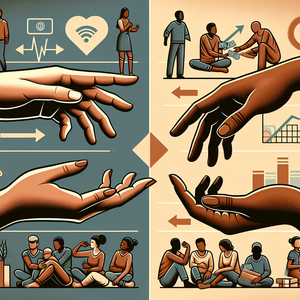Bridging the Gap: FinTech Solutions for Underbanked Communities in NYC

The term "underbanked" describes individuals and families who may have a basic bank account but do not have access to a full suite of financial services such as credit cards, loans, or savings accounts. According to the Federal Deposit Insurance Corporation (FDIC), around 7% of households in New York City are unbanked, while an additional 13% are underbanked. These communities often resort to high-cost alternative financial services, such as payday loans and check-cashing services, which can exacerbate their financial struggles and perpetuate cycles of poverty. The need for effective, accessible financial solutions is urgent and critical.
The Rise of FinTech Solutions
Fintech companies are stepping into this gap, leveraging technology to create accessible and user-friendly financial services tailored to the needs of underbanked populations. These solutions encompass a wide spectrum, including mobile banking apps, innovative lending platforms, and budgeting tools that utilize alternative data to assess creditworthiness. Key features often include lower fees, no minimum balance requirements, and educational resources designed to empower users.
Case Study: Propel
One standout example is Propel, a fintech company that has developed an app specifically for users of Supplemental Nutrition Assistance Program (SNAP) benefits. This app not only enables users to manage their benefits but also offers budgeting tools and educational content aimed at enhancing financial literacy. By addressing the unique challenges faced by low-income families, Propel has gained significant traction and has positively influenced the financial behaviors of its users. The app has become a vital resource for navigating financial resources and sustaining economic stability.
Case Study: Chime
Another notable player is Chime, which provides a no-fee mobile banking platform designed to cater to the underbanked. Chime's features include early direct deposit, automatic savings, and the absence of overdraft fees—attributes that make it particularly appealing to individuals who have previously struggled with traditional banking. With a strong focus on transparency and user empowerment, Chime has attracted millions of users, many of whom belong to the underbanked demographic. Its success exemplifies how fintech can address the specific needs of those often overlooked by traditional financial institutions.
The Social Impact of Financial Inclusion
The implications of fintech solutions for underbanked communities extend far beyond individual financial stability. Improved access to financial services has the potential to enhance economic resilience, enabling individuals to save money, invest in their futures, and build credit. Research has shown that providing low-cost banking services to underbanked individuals can significantly increase their savings capacity and reduce their dependence on predatory loans. Furthermore, financial inclusion can catalyze entrepreneurship. With better access to credit and banking services, individuals within underbanked communities can start small businesses, driving local economic growth and job creation. A study conducted by the Brookings Institution found that neighborhoods experiencing increased financial access saw a marked rise in small business startups. This underscores the broader economic benefits fintech initiatives can provide, contributing to a more vibrant urban economy.
The Road Ahead
Despite the positive strides made by fintech companies in addressing the needs of underbanked communities, several challenges remain. Issues such as digital literacy, trust in financial institutions, and potential technological barriers must be tackled to ensure that these solutions effectively reach those who need them most. To navigate these challenges, partnerships between fintech companies, community organizations, and policymakers are essential. Collaborating stakeholders can devise targeted strategies that educate and empower underbanked populations. By fostering a culture of financial literacy and trust, these partnerships can ensure that the benefits of fintech innovations are equitably distributed across all demographics.
Fintech solutions are playing a crucial role in bridging the financial gap for underbanked communities in New York City. By offering accessible, affordable financial services, these innovations are not only transforming individual lives but also reshaping the economic landscape of urban environments. As the fintech industry continues to grow and evolve, maintaining a focus on inclusivity and accessibility will be vital. The journey toward financial equity is ongoing, but with the right tools and partnerships in place, a brighter, more inclusive financial future for all New Yorkers is within reach. Fintech is not just about technology; it is about empowering individuals and fostering economic resilience in communities that have long been marginalized.
FinTech Product Manager
Chime, Propel, Affirm
Core Responsibilities
Lead the development and launch of financial products aimed at underbanked communities.
Collaborate with cross-functional teams, including engineering, design, and marketing, to define product vision and roadmap.
Analyze market trends and user feedback to drive product improvements and enhancements.
Required Skills
Strong understanding of financial services and fintech landscape, particularly in relation to low-income populations.
Proven experience in agile methodologies and product lifecycle management.
Excellent communication skills to articulate product vision and strategy to stakeholders.
Data Analyst - Financial Inclusion
Propel, Square, Credit Karma
Core Responsibilities
Analyze user data to identify trends and patterns in financial behaviors among underbanked communities.
Create dashboards and reports that inform product development and marketing strategies.
Collaborate with data scientists to develop predictive models for customer engagement and retention.
Required Skills
Proficiency in data analysis tools such as SQL, Python, or R.
Strong statistical analysis skills and experience with data visualization software (e.g., Tableau, Power BI).
Familiarity with financial metrics and key performance indicators relevant to fintech.
User Experience (UX) Designer - FinTech
Chime, Cash App, PayPal
Core Responsibilities
Design user-friendly interfaces for fintech applications catering to underbanked populations.
Conduct user research and usability testing to gather insights and improve user experience.
Collaborate closely with product managers and engineers to ensure design feasibility and implementation.
Required Skills
Strong portfolio showcasing experience in mobile and web application design, particularly for financial products.
Proficiency in design tools such as Adobe XD, Sketch, or Figma.
Understanding of accessibility standards and how they impact design for diverse user groups.
Financial Educator - Community Outreach
Local non-profits, credit unions, fintech companies focused on community outreach
Core Responsibilities
Develop and deliver financial literacy workshops tailored to underbanked communities.
Collaborate with local organizations to promote financial education initiatives and resources.
Assess community needs and adapt educational resources to address specific financial challenges faced by participants.
Required Skills
Strong background in personal finance, budgeting, and financial product knowledge.
Excellent public speaking and presentation skills, with experience in community engagement.
Ability to create educational materials that are clear and accessible for diverse audiences.
Compliance Analyst - FinTech
Fintech startups, traditional banks with fintech divisions, regulatory bodies
Core Responsibilities
Monitor and ensure compliance with financial regulations specific to services targeting underbanked populations.
Conduct risk assessments and audits to identify potential compliance issues in product offerings.
Collaborate with legal teams to implement policies that align with regulatory requirements.
Required Skills
Strong understanding of financial regulations, including anti-money laundering (AML) and know your customer (KYC) requirements.
Attention to detail and analytical skills to assess compliance risks effectively.
Experience with compliance software and reporting tools.


